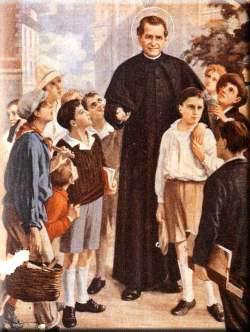Minds Locked Up
by
Thomas A. Droleskey
The father of the ideology of liberalism, John Locke, a Presbyterian who wrote to justify the overthrow of King James II, a Catholic, by the Parliament in the so-called "Glorious Revolution" of 1688, believed, essentially, that social problems could be ameliorated if a majority of reasonable men gathered together to discuss their situation. The discussion among these "reasonable men" would lead to an agreement, sanctioned by the approval of the majority amongst themselves, on the creation of structures which designed to improve the existing situation. If those structures did not ameliorate the problems or resulted in a worsening of social conditions then some subsequent majority of "reasonable men" would be able to tear up the "contract" that had bound them before, devising yet further structures designed to do what the previous structures could not accomplish.
Unfortunately for Locke, you see, social problems cannot be ameliorated merely by the creation of structures devised by "reasonable men" and sanctioned by the majority. All problems in the world, both individual and social, have their remote causes in Original Sin and their proximate causes in the Actual Sins of men. There is no once-and-for-all method or structure by which, for example, "peace" will be provided in the world by the creation of international organizations or building up or the drafting of treaties. There is no once-and-for-all method or structure by which, for example, "crime" will be lessened in a nation by the creation of various programs designed to address the "environmental" conditions that are said to breed it. The only way in which social conditions can be ameliorated is by the daily reformation of individual lives in cooperation with the graces won for men by the shedding of Our Lord's Most Precious Blood on the wood of the Holy Cross and administered into their souls by the working of the Holy Ghost in the sacraments entrusted to the true Church founded by Our Lord upon the Rock of Peter, the Pope. And to the extent that social structures can be effective in addressing specific problems at specific times in specific places those who create and administer them must recognize their absolute dependence upon God's graces and that there is no secular, non-denominational or inter-denominational way to provide for social order. Social order and peace among nations depend entirely upon the subordination of the life of every person and the activities of every nation to the Social Reign of Christ the King as it is exercised by the Catholic Church.
The modern state is founded on the specific and categorical rejection of the Social Reign of Christ the King as it is exercised by the Catholic Church. There is thus the need for modern man for find sterile ideologies or philosophies to substitute for the true Faith so as to guide "him" in the course of daily life. The failure of the social structures fashioned after the Lockean model to effect an amelioration of the problems they were intended to address does nothing to deter "true believers" from continuing to persist in the blindness that led them to reject the true Faith and to trust in their own cooked-up schemes. No, the "true believers" in liberalism or conservatism or capitalism or socialism or communism or fascism or Nazism or utilitarianism or pragmatism or positivism (or any and all other brands of secular "isms") must spend their entire lives searching for a "better way" to realize the goals of their particular ideology or philosophy or economic system. It cannot possibly be, they have convinced themselves, that their initial premises were wrong from the outset. No, the problem must be in the implementation of their ideas, not in the false nature of the ideas upon which they have based all of their truly delusional hopes.
The Lockean construct for the resolution of social problems is but one part of the Revolution, as it was termed by Popes Pius IX and Saint Pius X, against the Faith. The Lockean construct preceded the rise of contemporary Freemasonry in England by twenty-nine years, fitting in nicely with the Judeo-Masonic desire to obliterate the necessity of subordinating all things in personal and social life to the reality of the Incarnation by stressing the conviction that the "universal brotherhood of men" can put aside "denominational differences" to pursue the "common good." Locke's belief that men can resolve their social problems by the creation of structures, in essence the self-redemptive heresy of semi-Pelagianism, also dovetailed into the Judeo-Masonic belief that men can pursue "civic virtue" on their own without belief in, access to or cooperation with sanctifying grace. These false beliefs lead men and their societies into complete and utter chaos, which is the goal of the chief revolutionary, the devil himself, who desires the minds of men to be locked up by the blindness engendered by their narcissism and pride.
The Lockean construct leads to many mutations, all of which have one common theme: the ability of man to better his lot in life on his own without subordinating himself to the Deposit of Faith that the God-Man has entrusted to His true Church.
In the United States, for example, the Lockean construct has produced a situation where men liberalism had to give way to socialism. The failure of incremental, structural "reforms" to improve social conditions led to an increase in the size and the power of government at all levels (state, local, national) and a reduction in the legitimate natural law rights of citizens to be free from the tyranny of governmental leaders possessed of the nation that secular salvation comes from the state. Thus, the New Freedom of Woodrow Wilson was actually a descent into statism, expedited by the New Deal of Franklin Delano Roosevelt (and by many of the policies of his immediate predecessor, Herbert Clark Hoover; some New Dealers have admitted that the policies of their mentor's administration were in many instances merely a re-packaging of Hoover's own statist programs), and expanded by Lyndon Baines Johnson's "Great Society" and "War on Poverty" programs. The attempts to "engineer" the better society through government programs has reached such a stage that even thought itself is being punished at the state law (and laws are pending on the national level to make criticism of the behavior of certain people a "hate" crime). A land born in the delusional belief that man can ever be "free" without Our Lord and His Holy Church produces all to logically and inexorably a new caste of slaves, most of who are so diverted by bread and circuses that they protest nary a bit as their legitimate freedoms and property are taken away from them bit by bit under one pretext or another.
Elsewhere, however, the Lockean construct leads to a degree of violent frustration. That is, the failure of structural reforms to, say, "end" poverty or to "end" wars convinced a number of visionaries that violent, bloody revolutions were necessary to overthrow the remaining vestiges of Catholicism in order to replace it all at once with a man-made paradigm for peace and justice on earth. The French Revolutionaries, the Mexican Revolutionaries, the plotters of the Italian Risorgimento, the Bolshevik and Maoist Revolutionaries--and scores upon scores of others--believed that their revolutions would bring about a new age for mankind. The failure of even those "once-and-for-all" revolutions, however, to produce their expected results led to attempts to revitalize the revolutionary zeal, a "reform of the reform," if you will. And thus it will ever be with minds are all locked up in the demonically inspired delusions of Modernity.
Pope Saint Pius X recognized that inroads were being made by the Revolution into the human elements of the true Church, outside of which there is no salvation. He worked tirelessly to point out and to explicate how the errors of Modernity were manifesting themselves in the guise of Modernism within the Church. He was able to suppress the Modernists to a degree. Inspired with diabolical cunning and great patience, though, the Modernists and their pupils waited and plotted, seizing upon the Sacred Liturgy as the means by which they could continue their work, especially by seeking to enshrine the errors of ecumenism into the larger life of the Church Militant on earth. The revolutionaries within the Church wanted to use the Holy Sacrifice of the Mass as the vehicle through which they could re-define the Faith and reaffirm themselves in the same essential errors of Martin Luther, the chief prophet of the Revolution. The essential errors of Luther, founded in the sin of Presumption, are founded in the belief that men are saved by merely saying so and that the liturgy should reflect this fact rather than to remind men of their need to reform their lives and of the possibility that they could lose their souls for all eternity and wind up as the devil's prisoner in Hell itself.
This must be kept in mind when reviewing the comments made by Francis Cardinal Arinze, the
Prefect of the Congregation for Divine Worship and the Sacraments, as reported by the Zenit propaganda agency on Thursday, October 13, 2005:
VATICAN CITY, OCT. 13, 2005 (Zenit.org).- No one at the Synod of Bishops on the Eucharist has addressed the issue of the "Tridentine rite" Mass that the Latin Church used before the Second Vatican Council.
The prefect of the Congregation for Divine Worship and the Sacraments, Cardinal Francis Arinze, mentioned this at a press conference today when he evaluated the first phase of the synodal assembly.
"No synodal father has mentioned this point," said Cardinal Arinze, the co-president of the assembly. The so-called Tridentine rite was approved by Pope St. Pius V.
"If there are groups that desire the Tridentine Mass, this is already provided for," he said. "Bishops may allow it for groups."
"It is not a priority for the synod, as no one has spoken about it," the cardinal concluded. "The problem we have discussed is that many people don't go to Mass, and those that come don't understand -- they go to Communion but not to confession, as if they were immaculate."
Poor Cardinal Arinze is a victim of the revolution in which he has long been a participant. This has blinded him to the fact, discussed by the late Monsignor Klaus Gamer in The Reform of the Roman Liturgy, that Catholics no longer assist at Holy Mass because the Mass itself is not about God, it is about themselves and their own disordered self-love.
Was all this really done because of a pastoral concern about the souls of the faithful, or did it not rather represent a radical breach with the traditional rite, to prevent the further use of traditional liturgical texts and thus to make the celebration of the "Tridentime Mass" impossible--because it no loner reflected the new spirit moving through the Church?
Indeed, it should come as no surprise to anyone that the prohibition of the traditional rite was announced at the same time as the introduction of the new liturgical texts; and that a dispensation to continue celebrating the Mass according to the traditional rite was granted only to older priests.
Obviously, the reformers wanted a completely new liturgy, a liturgy that differed from the traditional one in spirit as well as in form; and in no way a liturgy that represented what the Council Fathers had envisioned, i.e., a liturgy that would meet the pastoral needs of the faithful.
Liturgy and faith are interdependent. That is why a new rite was created, a rite that in many ways reflects the bias of the new (modernist) theology. The traditional liturgy simply could not be allowed to exist in its established form because it was permeated with the truths of the traditional faith and the ancient forms of piety. For this reason alone, much was abolished and new rites, prayers and hymns were introduced, as were the new readings from Scripture, which conveniently left out those passages that did not square with the teachings of modern theology--for example, references to a God who judges and punishes.
At the same time, the priests and the faithful are told that the new liturgy created after the Second Vatican Council is identical in essence with the liturgy that has been in use in the Catholic Church up to this point, and that the only changes introduced involved reviving some earlier liturgical forms and removing a few duplications, but above all getting rid of elements of no particular interest.
Most priests accepted these assurances about the continuity of liturgical forms of worship and accepted the new rite with the same unquestioning obedience with which they had accepted the minor ritual changes introduced by Rome from time to time in the past, changes beginning with the reform of the Divine Office and of the liturgical chant introduced by Pope St. Pius X.
Following this strategy, the groups pushing for reform were able to take advantage of and at the same time abuse the sense of obedience among the older priests, and the common good will of the majority of the faithful, while, in many cases, they themselves refused to obey.
The pastoral benefits that so many idealists had hoped the new liturgy would bring about did not materialize. Our churches emptied in spite of the new liturgy (or because of it?), and the faithful continue to fall away from the Church in droves.
Although our young people have been literally seduced in to supporting the new forms of liturgical worship, they have, in fact, become more and more alienated from the faith. They are drawn to religious sects--Christian and non-Christian ones--because fewer and fewer priests teach them the riches of our Catholic faith and the tenets of Christian morality. As for older people, the radical changes made ot the traditional liturgy have taken from them the sense of security in their religious home.
Monsignor Gamber was not a traditionalist. He was, though, a honest liturgist who saw how the Novus Ordo Missae had destroyed the sensus fidei and thus drove Catholics out of the Church. Although I have written on this matter endlessly (please purchase G.I.R.M. Warfare for a thorough review of these issues), here is a summary of the ways in which the Novus Ordo Missae has made war against the Catholic Faith and thus driven Catholics away from the Church at the same time it has failed to convince Protestants to abandon their own liturgies for a Protestantized Catholic Mass, modeled along the lines that would have made Saint Edmund Campion and the other English Martyrs react with fury against the corruption of the Faith by the heresies of the Protestant Revolt they fought with their very lives:
1) The Traditional Latin Mass clearly communicates that it is a propitiatory offering for human sins, the perpetuation in an unbloody manner of the Sacrifice of the Chief Priest and Victim of every Mass, Our Blessed Lord and Saviour Jesus Christ, on an altar of sacrifice by a sacerdos acting in persona Christi.
2) The Traditional Latin Mass is oriented completely to God, starting from the first moment a priest makes the Sign of the Cross and prays Psalm 42, the Judica me, at the foot of the steps to the altar. The first thing the priest does in the Traditional Latin Mass is to address God and to prepare himself to ascend the "holy mountain" symbolized by the three steps leading to the altar (also signifying Father, Son, and Holy Ghost). The first thing a priest does in the Novus Ordo Missae after making the Sign of the Cross is to address the people, at which time he is permitted by the rubrics of the General Instruction to the Roman Missal to improvise with a few words of his own to "introduce" the Mass.
3) The Traditional Latin Mass reflects the permanence and stability of God Himself and of our need for Him. Although there are differences in the genres of the Immemorial Mass of Tradition (Pontifical High Mass, Solemn High Mass, Missa Cantata, Low Mass), the rubrics are fixed within each of the genres and are beyond the ability of the celebrant to licitly alter. The Novus Ordo Missae admits of so many legitimate changes and adaptations for a whole variety of reasons that to speak of it as a "fixed rite" is an absolute absurdity. It is not. It produces of its very fungible nature uncertainty and instability, the very opposite of what the worship of God is supposed to produce.
4) The Traditional Latin Mass contains prayers that remind men of their sinfulness and of the necessity of the possibility of losing their souls for all eternity. Cardinal Arinze wants to know why people think their souls are immaculate and are thus not going to confession? The Novus Ordo Missae reaffirms people in their essential "goodness." It is a rejection of the Church's centuries-old wisdom in mandating the faithful to perform outward acts of penance in order to discipline their souls. Doubt that this is the case? Doubt no more. Here is passage from G.I.R.M. Warfare dealing with Paragraph 15 of the General Instruction to the Roman Missal:
Paragraph 15 of GIRM reads:
"Thus the Church remains faithful in its responsibility as a teacher of truth to guard 'things old,' that is, the deposit of tradition; at the same time it fulfills another duty, that of examining and prudently bringing forth 'things new.'
"Accordingly, a part of the new Roman Missal directs the prayer of the Church expressly to the needs of our times. This is above all true of the ritual Masses and the Masses for various needs and occasions, which happily combine the traditional and the contemporary. Thus many expressions, drawn from the Church's most ancient tradition and familiar through the many editions of the Roman Missal, have remained unchanged. Other expressions, however, have been adapted to today's needs and circumstances and still others-for example, the prayers for the Church, the laity, the sanctification of human work, the community of all peoples, certain needs proper to our era-are completely new compositions, drawing on the thoughts and even the very language of the recent conciliar documents.
"The same awareness of the present state of the world also influenced the use of texts from very ancient tradition. It seemed that this cherished treasure would not be harmed if some phrases were changed so that the style of language would be more in accord with the language of modern theology and would faithfully reflect the actual state of the Church's discipline. Thus there have been changes of some expressions bearing on the evaluation and use of the good things of the earth and of allusions to a particular form of outward penance belonging to another age in the history of the Church.
"In short, the liturgical norms of the Council of Trent have been completed and improved in many respects by those of the Second Vatican Council. The Council has brought to realization the efforts of the last four hundred years to move the faithful closer to the sacred liturgy, especially the efforts of recent times and above all the zeal for the liturgy promoted by Saint Pius X and his successors."
Comment and Analysis:
Holy Mass is supposed to be suited to the needs of all times, not just our times. Herein, therefore, lies the real nub of the problem with the General Instruction to the Roman Missal and thus the Novus Ordo itself: a reliance upon the spirit of one particular time in history results in the glorification of the human spirit and not that of the Blessed Trinity. It is really that simple. God exists outside of time and space. The worship of God must convey, as noted earlier, the timelessness of God and the immortality of our own souls, which will live forever either in Heaven or in Hell once the Last Judgment has taken place. Again, as noted earlier, the Mass is supposed to be a refuge from the world, not a glorification of it.
"It seemed that this cherished treasure [ancient tradition] would not be harmed if some phrases were changed so that the style of language would be more in accord with the language of modern theology and would faithfully reflect the actual state of the Church's discipline."
Well, our ancient tradition is not the only casualty wrought by the changing of phrases of the Mass texts (Introits, Collects, Secrets, Prayer after Communion, the very Offertory Prayers themselves, the addition of first three and then five more new "Eucharistic prayers"). The very faith life of many Catholics has been harmed.
One of the reasons that the Sacrament of Penance fell into disuse is that the faithful are no longer reminded of their sinfulness in the prayers of the Mass. The faithful thus believe there is no need to reconcile themselves to the Father through the Son in Spirit in and in Truth in the hospital of Divine Mercy which is the confessional. No, one cannot sin as long as one's "fundamental option" is for God.
Indeed, as is noted in the rest of this book, a priest has many legitimate options by which to invite the people to express themselves in what is now called the Penitential Rite. A growing number of priests believe that "modern theology" requires them not to stress the sinfulness of the period and their need for God's forgiveness but to celebrate human goodness and to give thanks to God for all that He has given us. However, man's need to recognize himself as a sinner and to do penance for his sins is unchanging. The harm done to souls by the changing of the "style of language" in the new Mass is incalculable.
The concluding part of Paragraph 15 is a little bit akin to the old phrase, "The lady doth protest too much." All of the repeated attempts to state that the new Mass is a continuation of our liturgical tradition (which GIRM itself contradicts in the body of Paragraph 15, as noted in my discussion about the changes in the texts of the prayers of the Mass) are efforts to try to convince readers that the new Mass really, really, really, really, really is what GIRM says it is.
The trouble with gratuitous statements is that they are made without foundation, sinking into the quicksand upon which they are made. They are efforts to justify a revolution which has undermined the faith and profaned the honor and glory due God in the Sacrifice of the Mass. GIRM is revisionist history writ large.
5) The Traditional Latin Mass contains the Offertory that clearly communicates the theology of the sacrificial, propitiatory nature of the Mass. The Novus Ordo Missae uses Jewish "table prayers" from the Talmud for what is called the "Preparation of the Gifts."
6) The Traditional Latin Mass conveys the dignity of the priesthood and its sacerdotal, hierarchical nature by the very structure of the Church. The sanctuary, reflecting the timeless of God and the fact that the Mass is the unbloody re-presentation of Calvary, is the "holy of holies" into only those males who are seen as the extension of the hands of the priest (who is a male because Our Lord came as a male) are permitted to enter and assist during the offering of Holy Mass. The faithful in the nave of the Church are thus set apart from the sanctuary, which is cordoned off, if you will, by the altar rail, signifying the distinction between time and eternity and the distinction between the sacerdotal priesthood of the ordained priest and the common priesthood the lay faithful by means of Baptism. There is no confusion as to the roles of the priest and the laity, clearly reflecting the hierarchy of God Himself and the sacrificial nature of the Mass.
7) The Traditional Latin Mass conveys stability in yet another sense: the same readings are read year in and year out. Repetition is the mother of learning. Knowing us to be such stupid and distracted creatures, God wants us immersed in the repetition of the same readings year in and year out, thus exposing us to the possibility of "getting it," say, after sixty or seventy years of hearing the same readings read year in and year out.
8) Finally, and please understand that this list is not exhaustive at all (I go into much greater detail in G.I.R.M. Warfare), that Catholics are less inclined to see the necessity of praying and working for the restoration of the Social Reign of Christ the King when the Mass at which they assist has dethroned His Kingly Dignity by instituting profane novelties (please see the horrors appended below) that actually enshrine the false values of the world. The Traditional Latin Mass conveys in all of its component parts, woven together so perfectly that it could not have been constructed by man synthetically, the Universal Kingship of Christ, Our High Priest and King. Make a mess of the Mass, make a mess of the Church and the world.
Cardinal Arinze, however, is caught up in the throes of a Revolution against the Faith, not realizing that he is involved in a revolution at all. He believes that there is some other cause for the decline in attendance at Holy Mass and the use of the Sacrament of Penance other than the warfare made against the perennial Tradition of the Catholic Church, expressed so perfectly and beautifully in the very Mass that Our Lord Himself taught the Apostles to say. He will search in vain for some other cause. Caught up in the Lockean trap of seeking structural solutions where none are to be found because none exist, Cardinal Arinze and his brother cardinals and bishops must convince themselves that have to "reform" a "reform" that was no reform at all but an attack on all that was authentically Catholic in the Holy Sacrifice of the Mass.
Doubt my word once again? Consider the words of Archbishop (then Monsignor) Annibale Bugnini, found in L'Osservatore Romano in March of 1965:
"We must strip from our Catholic prayers and from the Catholic liturgy everything which can be the shadow of a stumbling block for our separated brethren that is for the Protestants."
The result has been nothing other than devastation for the Church in her human elements and thus for the souls that depend upon their shepherds to get them home safely to Heaven. Anyone who does not see this is willfully blind.
Our commitment to the full restoration of Tradition and the suppression of the profane novelty known as the Novus Ordo Missae must continue undaunted in the face of the comments of Cardinal Arinze (and in the face of Zenit's all-too-predictable caricature of the "Tridentine Mass" as somehow being a creation of Pope Saint Pius V and the Council of Trent rather than such a perfect expression of the Mass of the preceding 1500 years that all but two dioceses who could prove local usage dating back more than 200 years opted to use the Missale Romanum promulgated by Pope Saint Pius V than adhere to their own particular variation of the Mass of Tradition). The work of the bishops and priests of the Society of Saint Pius X, which has been the strongest and most organized institutional force to oppose the novelties of the past forty years, must continue. The work of priests such as Fathers Patrick Perez and Paul Sretenovic and Lawrence Smith and Ronald Ringrose must continue. The work of the perennial Tradition of the Catholic Church, in other words, must continue in our own homes as we seek to eschew anything and everything that can lead us down (or back to) the path of compromise and sloth with the Revolution. We must not permit our minds to be "locked up" by the empty, hallow words of men who have no clear understanding of the truths of the Faith and who are thus, barring a major miracle, to be kept a prisoner in their own warped paradigms until they die.
Imploring Our Lady, Help of Christians, to assist us to remain steadfast in our love for and fidelity to the Immemorial Mass of Tradition, let us continue to pray and to make sacrifices to her Sorrowful and Immaculate Heart that the shepherds of her Divine Son's Church will have their minds enlightened and their eyes opened to this simple fact: the Triumph of her Immaculate Heart, which will be the fruit of the proper consecration of Russia to her by a pope with all of the world's bishops, will be the triumph of Tradition in the Church and Christendom in the world, things to be embraced, not eschewed, for the honor and glory of the Blessed Trinity and thus for the sanctification and salvation of human souls.
Our Lady, Help of Christians, pray for us.
Saints Peter and Paul, pray for us.
Pope Saint Pius V, pray for us.
Pope Saint Pius X, pray for us.
Pope Saint Callistus, pray for us.
Saint Teresa of Avila, pray for us.
Saint Philomena, pray for us.
Just a Reminder That The Priests Below are in "Good Standing," which should tell you the importance of "good standing" these days
The following has been shown on the AngelQueen.org website, linked to by www.remnantnewspaper.com. The narration and the photographs have been copied from www.angelqueen.org.
Mockery of St John Bosco in the worst Mass ever
Is it any wonder when the Salesian Bishop of Linz on the left finds amusing a puppet which is meant to be the founder of his Order, Don Bosco that the Salesians of Don Bosco are in such trouble in Austria?
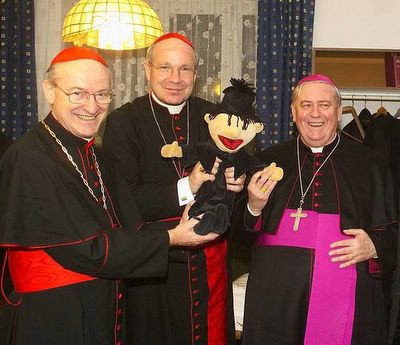
Here are pictures of several Salesian Masses, ending with the worst ever in the whole Catholic world.
First, the "Dirty Washing" Mass
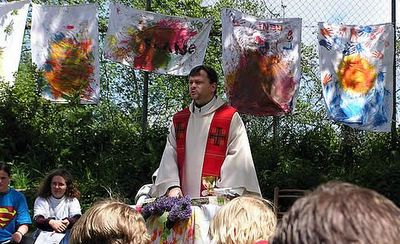
Another from the same Mass.
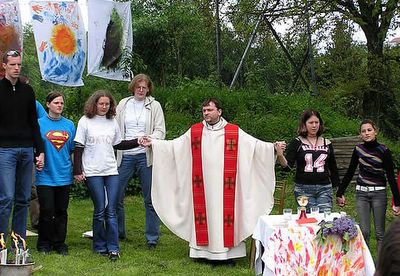
The "Smiley" Mass
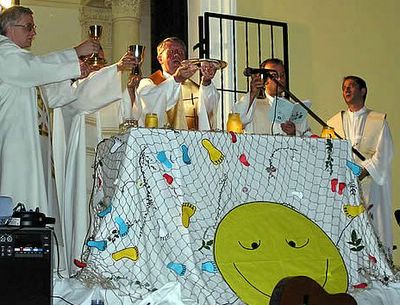
Including a central role for the guitar but not for the Cross
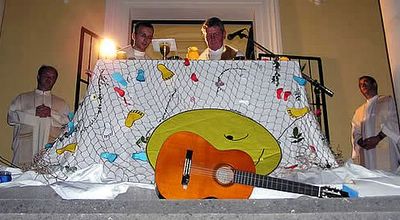
The "Smartie" Mass
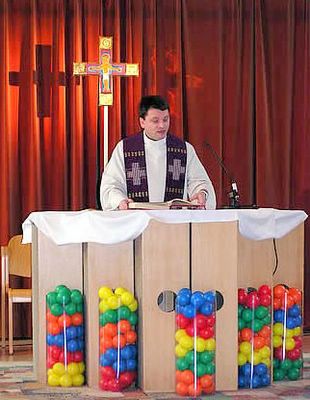
Real smarties for comparison!

Meaningless! Symbolising nothing

More girls pretending to be Our Lord Crucified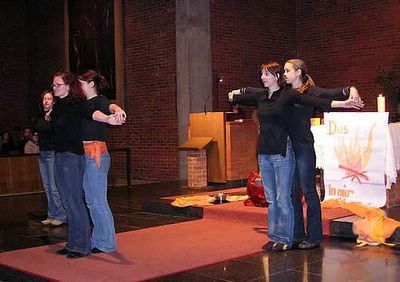
Altar "prepared" for a Mountain Mass

Would you believe that these people are assisting at the Holy Sacrifice of the Mass?
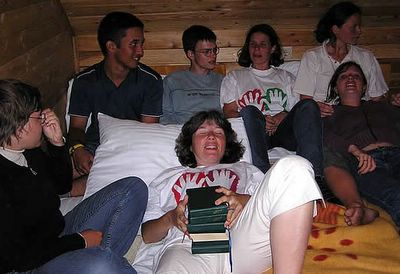
Yes, once you have seen the "Ping-Pong" Mass. This Salesian Father is presiding at the worst Mass that there has ever been. Please e-mail me if you think that you have seen worse!
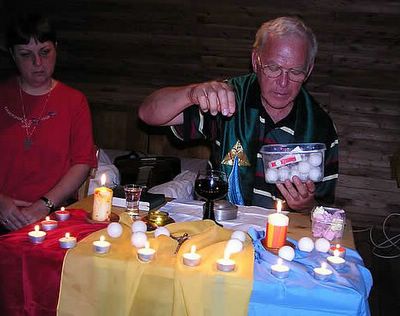
St John Bosco, pray for us!
